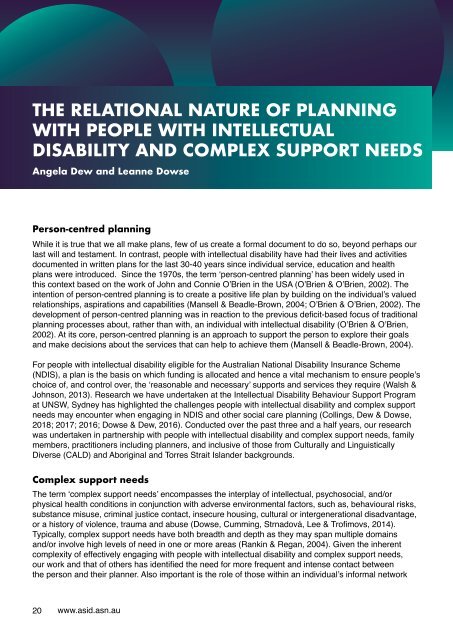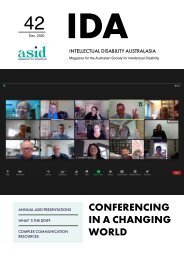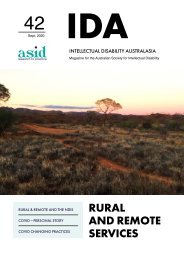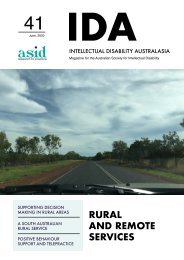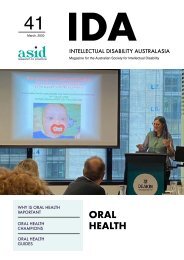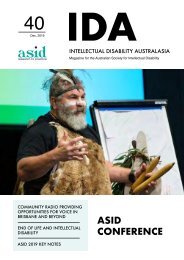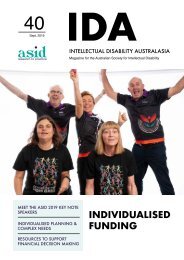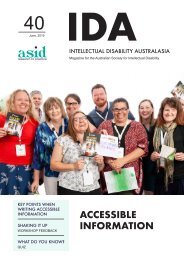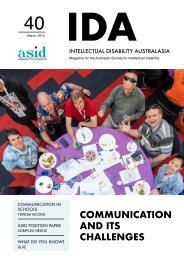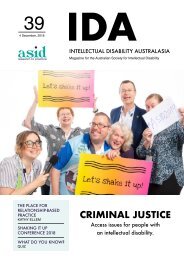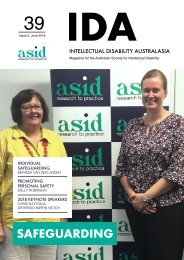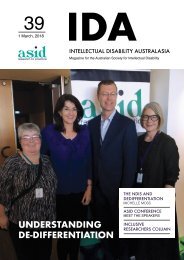IDA Magazine Vol 39 Iss 3 (Sept 2018)
Create successful ePaper yourself
Turn your PDF publications into a flip-book with our unique Google optimized e-Paper software.
THE RELATIONAL NATURE OF PLANNING<br />
WITH PEOPLE WITH INTELLECTUAL<br />
DISABILITY AND COMPLEX SUPPORT NEEDS<br />
Descriptive Sub-title Descriptive Sub-title Descriptive<br />
Sub-title.<br />
Angela Dew and Leanne Dowse<br />
Person-centred planning<br />
While it is true that we all make plans, few of us create a formal document to do so, beyond perhaps our<br />
last will and testament. In contrast, people with intellectual disability have had their lives and activities<br />
documented in written plans for the last 30-40 years since individual service, education and health<br />
plans were introduced. Since the 1970s, the term ‘person-centred planning’ has been widely used in<br />
this context based on the work of John and Connie O’Brien in the USA (O’Brien & O’Brien, 2002). The<br />
intention of person-centred planning is to create a positive life plan by building on the individual’s valued<br />
relationships, aspirations and capabilities (Mansell & Beadle-Brown, 2004; O’Brien & O’Brien, 2002). The<br />
development of person-centred planning was in reaction to the previous deficit-based focus of traditional<br />
planning processes about, rather than with, an individual with intellectual disability (O’Brien & O’Brien,<br />
2002). At its core, person-centred planning is an approach to support the person to explore their goals<br />
and make decisions about the services that can help to achieve them (Mansell & Beadle-Brown, 2004).<br />
For people with intellectual disability eligible for the Australian National Disability Insurance Scheme<br />
(NDIS), a plan is the basis on which funding is allocated and hence a vital mechanism to ensure people’s<br />
choice of, and control over, the ‘reasonable and necessary’ supports and services they require (Walsh &<br />
Johnson, 2013). Research we have undertaken at the Intellectual Disability Behaviour Support Program<br />
at UNSW, Sydney has highlighted the challenges people with intellectual disability and complex support<br />
needs may encounter when engaging in NDIS and other social care planning (Collings, Dew & Dowse,<br />
<strong>2018</strong>; 2017; 2016; Dowse & Dew, 2016). Conducted over the past three and a half years, our research<br />
was undertaken in partnership with people with intellectual disability and complex support needs, family<br />
members, practitioners including planners, and inclusive of those from Culturally and Linguistically<br />
Diverse (CALD) and Aboriginal and Torres Strait Islander backgrounds.<br />
Complex support needs<br />
The term ‘complex support needs’ encompasses the interplay of intellectual, psychosocial, and/or<br />
physical health conditions in conjunction with adverse environmental factors, such as, behavioural risks,<br />
substance misuse, criminal justice contact, insecure housing, cultural or intergenerational disadvantage,<br />
or a history of violence, trauma and abuse (Dowse, Cumming, Strnadová, Lee & Trofimovs, 2014).<br />
Typically, complex support needs have both breadth and depth as they may span multiple domains<br />
and/or involve high levels of need in one or more areas (Rankin & Regan, 2004). Given the inherent<br />
complexity of effectively engaging with people with intellectual disability and complex support needs,<br />
our work and that of others has identified the need for more frequent and intense contact between<br />
the person and their planner. Also important is the role of those within an individual’s informal network<br />
20 www.asid.asn.au


